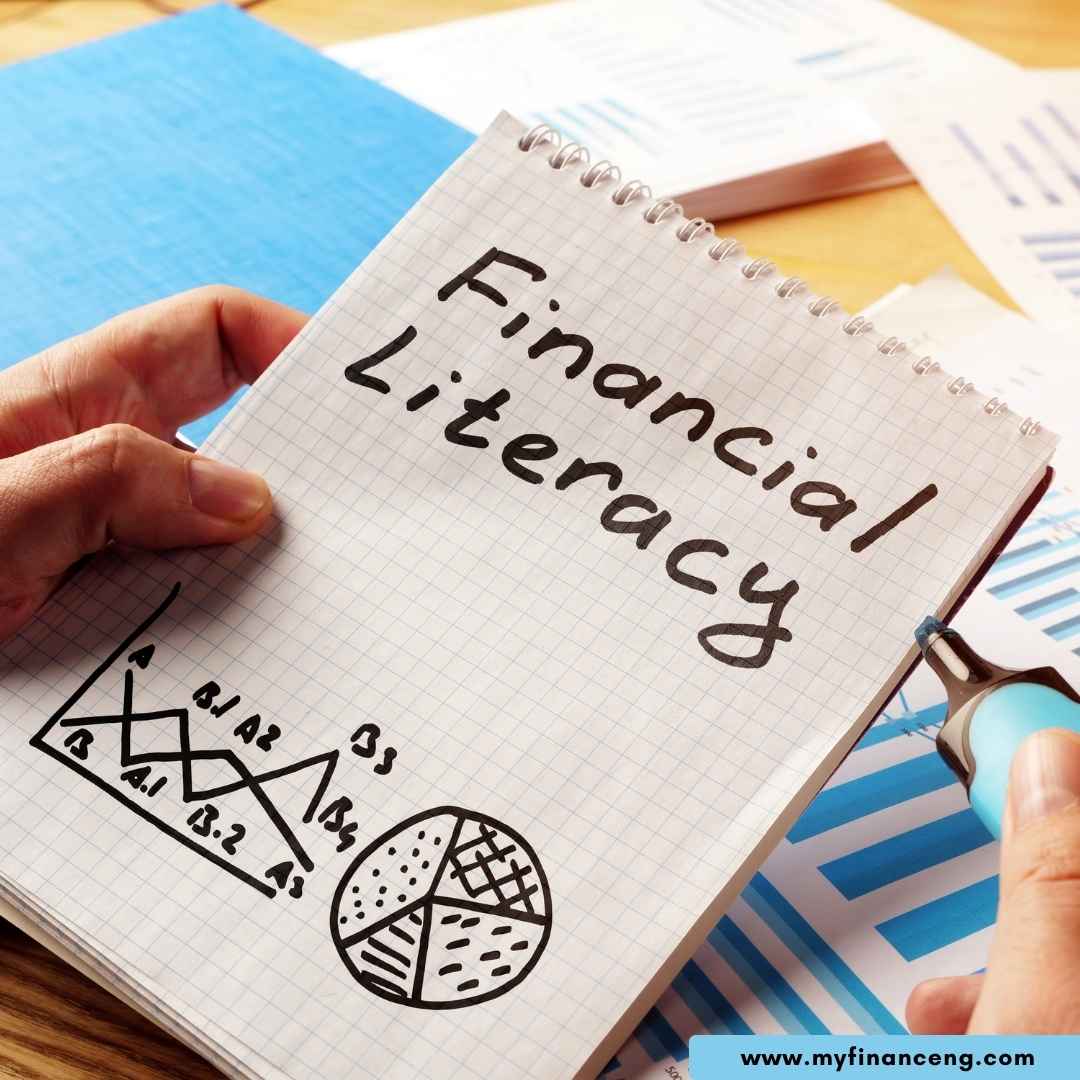Introduction
Financial literacy for all is essential for empowering individuals, reducing debt, and building financial security for a prosperous future.
Knowing the lay of the land in today’s monetary morass is a position of power. As economic systems change, financial literacy is more important than ever. It’s not just high-powered executives or employees of big companies who need money smarts; financial literacy is a life skill.
Young adults just entering the workforce and older individuals already earning an income need money management basics to succeed.
But why is financial literacy so thoroughly central to success? This post is an insightful look at the importance of financial literacy and how it can affect an individual’s personal, professional, and societal advancement.
What Is Financial Literacy?
Financial literacy definition
Financial literacy is the mastery of personal financial responsibilities. That includes understanding budgeting, saving, investing, loans, interest rates, and the financial instruments available for consumption in the economic marketplace.
Elements of financial literacy
There are many skills encapsulated by financial literacy. These include:
- Budget: Keeping track of and controlling one’s income and expenses.
- Saving: The ability to save for short-term and long-term goals like retirement.
- Investing: Types of investments and how to make them work for you to create wealth.
- Debt Management – The knowledge of managing debt and staying out of financial pitfalls.
- Financial Planning: The ability to establish monetary goals and work toward buying a house, opening a business, or achieving an enjoyable retirement.
The World’s Demand For Financially Educated People
Facts And Figures: Financial Illiteracy
Lack of financial literacy is a worldwide problem that cuts across all socioeconomic levels. More than 60% of adults do not have basic financial literacy, says an OECD report. Even in developed countries, most people have difficulty making sensible financial decisions.
Where Financial Education Falls Short Around the World
Sadly, traditional financial literacy is limited worldwide, both in developing and developed countries. Although many people learn how to read, write, and do math, few ever learn about managing money. This deficit in financial literacy leads to poor money choices, which can lead to excessive debt, financial instability, and missed financial opportunities.
Learning to Make Financial Decisions: Financial Literacy’s Influence on the Financing Process
Savvy Budgeting and Financial Planning
Financial literacy is getting the information to make and stick to a budget. It fosters a saving habit early on, making one prepared for both short-term emergencies and long-term goals like retirement. That’s because financially literate people are less likely to take on undue debt, live above their means, and eventually save for retirement.
Investment Strategy and Risk Management
A financially literate individual knows about investment options and their risks. This knowledge allows people to make confident decisions about stocks, bonds, real estate, and other investment options. They also have the wherewithal to take advantage of socioeconomic diversity to minimize volatility when trying their hand at investing.
Freedom When You Are Educated in How Money Works

The Link between Wealth and Self-Development
Success in life is determined mainly by financial stability. People who know how to handle money are more in control of their lives. Monetary freedom gives you more opportunities for education, career, and personal growth.
The Influence of Financial Literacy on Personal Opportunities
Financial literacy is the key to opening doors of opportunity that would otherwise close. Whether getting things in place for a student loan or trying to finance a house purchase, being in control of one’s financial options helps one take the opportunities that will drive them toward the future they want. It is a mechanism for people to use their money to improve their lives.
Financial Education for Financial Independence
Reducing Financial Dependency
Financial education can curb dependence on outside income. Financially literate people are better equipped to manage their money, attract savings, and create additional income opportunities. Understanding their financial situation results in independence and freedom.
Gaining Knowledge About Wealth is Generating Wealth
Personal finance education creates a wealth-building mindset. Money-literate people know how to invest smart, avoid risky financial habits, and what the chances of having wealth after years of building it. Their understanding paves the path for future financial freedom and wealth.
1: Use Your Knowledge of Finance to Get Out of Debt
Debt Management for Financial Literacy
Debt is an unwieldy beast, especially when you have no idea how to handle it. Financial literacy helps people learn to use debt wisely, pay it effectively, and avoid pitfalls like high-interest loans or credit card debt. Interest rates and repayment tactics are the keys to saving people a lot of money in the long run.
How Knowledge of Interest Rates Can Help Manage Debt
Understanding interest rates enables financially literate people to make more informed decisions about loans and credit. They can opt for better lending products, abandon those with excessively high interest rates, and deal with loans in a manner that ensures debt will not be stressful.
Financial Literacy and Vocational Promotion
CAREER PROS FINANCE FINSEQ Skills in Financial Management for the Career Professional
Financial literacy is a necessity in the business world. I don’t know, but I do know that whether you’re a department head with budget control, a strategic investor, or negotiating a pay rise, it’s the foundation of all of it. A financially savvy professional can impact business decisions, take a leadership role in resource management, and be well-positioned to advance their career.
The Influence of Financial Knowledge on Entrepreneurship and Leadership
Financial literacy is key for entrepreneurs and businesspeople. Leaders equipped with financial knowledge can make informed investment calls that increase company value.
They’ll know where money can be saved, how to evaluate the risk of an investment, and how to best plan for the company’s finances moving forward.
Financial Literacy and the Fight Against Poverty

The Relationship Between Financial Literacy and Poverty Cut
One of the best ways to fight poverty is through financial literacy. If people know how to handle money, they should not find themselves in debt traps or over-borrow. This information allows people to accumulate wealth, upgrade their quality of life, and escape the cycle of poverty.
Real Examples of Financial Literacy Making a Difference
Globally, communities that adopt financial education programs experience decreased levels of poverty. Teaching people how to manage their money helps develop reasonable budgets, helps people save, and gives them better access to credit so they can attain the means necessary to have a prosperous future.
Enhancing Financial Literacy: In Schools and Our Communities
Should Financial Literacy Be Taught at an Early Age?
Financial literacy is a crucial aspect of life that should be taught in school. By teaching kids about how to manage money through saving and budgeting, we give them the know-how to make financial decisions early in their lives. The sooner these ideas are implanted, the more stable they are later in life.
Community Efforts To Advance Financial Education
The public also plays a vital role in financial literacy. Local workshops, seminars, and financial literacy programs can empower people and families. When communities can paint the picture of education while sounding the call, the gap to financial literacy narrows, and wealth is prosperous for all.
The Impact of Financial Literacy on Small Business
Entrepreneur Minds: 100 Essential Beliefs, Characteristics, and Habits of Elite Entrepreneurs
Small business owners have special financial concerns. Knowing how to manage cash flow, keep expenses in check, and make strategic choices about how to invest in your business is part of the rhythm of business. Having control over one’s finances allows young entrepreneurs to make sound decisions, which leads to their enterprises surviving and making profits.
The Power of Financial Literacy in Business Success
The well-informed entrepreneur is likely to be successful. Financial literacy enables entrepreneurs to project financial requirements, handle business taxes, and be ready for economic slumps. Through financial literacy, small business owners can protect themselves from surprise blows and compete successfully in a challenging market.
Financial Literacy and Family Health
How Financial Education Can Shape Family Life
A fiscally literate family reduces stress and tension and enhances harmony. Including your family’s finances in your arsenal allows you to share in decision-making, from spending and saving to investing. This teamwork minimizes threats and will provide for everybody’s financial needs.
Long-Run Implications: This has led to Extended Impacts of Financial Knowledge on Family Stability.
Financial literacy is a common household practice that drives and secures the future. Whether saving for college or retirement, financial education equips families with the tools to help the next generation succeed and establish long-term economic health and stability.
Developing Financial Literacy in the Next Generation
Passing on Financial Wisdom to Kids
One of the most valuable tools a parent can pass on is financial knowledge. Teaching children about money early in life can help prevent bad financial habits in adulthood. By sharing your tapestry of financial experience, you are also teaching them positive behavior so that they can make good financial decisions themselves.
How Parents Can Help Their Children Learn the ABCs of Finance
Principals also have an important influence on helping to develop financial literacy among students. Parents can convey the importance of financial responsibility in many ways, from opening savings accounts to imparting budgeting skills. Developing an early awareness of these skills can support the next generation in becoming successful adult financial citizens.
The Connection Between Financial Literacy and Financial Well-being

Why Does Personal Finance Knowledge Lead to Long-Term Financial Security
Long-term security is implicitly correlated with financial literacy. People who understand how to budget, save, invest, and avoid too much debt are better equipped to protect themselves in times of financial strain. This type of proactive personal finance is the evolution of financial security.
Resistance to Downturns in the Economy
Financial education targets the resiliency needed to cope with economic turmoil. People who know how to diversify their investments, save for unexpected events, and not rely on debt move through recessions and economic downturns with self-assurance and certainty.
Barriers to Financial Literacy
The Main Obstacles to Acquiring Financial Knowledge
Several obstacles keep people from becoming financially educated. Among them are limited access to resources, subpar educational offerings, and societal misinformation about money. This resistance can result in many people lacking money management skills.
Overcoming These Barriers with the Right Resources
Financial education must be more accessible to address these barriers. Online tools, community education sessions, and financial literacy initiatives can all help provide people with the knowledge to become less financially illiterate. Financial literacy is a skill that could be available to everyone with the right tools.
The Benefits of Financial Literacy for All
Gains for Individuals and Society Overall
Financial literacy has many advantages for both the individual and society. It alleviates poverty, promotes economic security, and promotes responsible purchases. For society, a more financially literate population can contribute to greater economic stability, reduced debt, and better financial choices across the board.
The Effect of Financial Knowledge on Communities
When members of the community are financially competent, they help improve the community. This builds wealth and creates wealth so that younger people can continue to perpetuate this financial savvy throughout society.”
Conclusion
Financial literacy is more than a private benefit; it is a path to success for individuals, families, and communities.
By learning the basics of managing money and making sound financial decisions, people can overcome financial obstacles and work toward long-term goals.
From self-improvement to financial independence, financial literacy is undeniably the foundation of a positive future.

